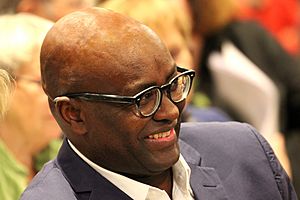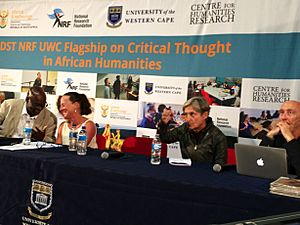Achille Mbembe facts for kids
Quick facts for kids
Achille Mbembe
|
|
|---|---|

Mbembe in 2015
|
|
| Born |
Joseph-Achille Mbembe
1957 (age 67–68) Otélé, French Cameroon
|
| Nationality | Cameroonian |
| Alma mater | Sorbonne Instituts d'études politiques |
| Spouse(s) | Sarah Nuttall |
| Awards | Geschwister-Scholl-Preis |
| Scientific career | |
| Institutions | University of the Witwatersrand, Duke University |
| Influences | Jean-Marc Ela, Fabien Eboussi Boulaga, Frantz Fanon, Michel Foucault, Bernard Stiegler, Hannah Arendt |
Joseph-Achille Mbembe (/əmˈbɛmbeɪ/; born 1957), is a Cameroonian historian and political theorist who is a research professor in history and politics at the Wits Institute for Social and Economy Research at the University of the Witwatersrand. He is well known for his writings on colonialism and its consequences and is a leading figure in new wave French critical theory.
Contents
Biography
Mbembe was born near Otélé in Cameroon in 1957. He obtained his Ph.D. in history at the University of Sorbonne in Paris, France, in 1989. He subsequently obtained a D.E.A. in political science at the Instituts d'études politiques in the same city. He has held appointments at Columbia University in New York, Brookings Institution in Washington, D.C., University of Pennsylvania, University of California, Berkeley, Yale University, Duke University and Council for the Development of Social Science Research in Africa (CODESRIA) in Dakar, Senegal.
Mbembe was assistant professor of history at Columbia University, New York, from 1988 to 1991, a senior research fellow at the Brookings Institution in Washington, D.C., from 1991 to 1992, associate professor of history at the University of Pennsylvania from 1992 to 1996, executive director of the Council for the Development of Social Science Research in Africa (Codesria) in Dakar, Senegal, from 1996 to 2000. Achille was also a visiting professor at the University of California, Berkeley, in 2001, and a visiting professor at Yale University in 2003. He was a research professor in history and politics at Harvard University's W. E. B. Du Bois Research Institute. In 2020 Mbembe delivered the presidential lecture in the Humanities at Stanford University.
Mbembe has written extensively on African history and politics, including La naissance du maquis dans le Sud-Cameroun (Paris: Karthala, 1996). On the Postcolony was published in Paris in 2000 in French and the English translation was published by the University of California Press, Berkeley, in 2001. In 2015, Wits University Press published a new, African edition. He has an A1 rating from the National Research Foundation. On March 14, 2024, Achille Mbembe was awarded the 2024 Holberg Prize for arts and letters, humanities, law and theology. The handover ceremony takes place on June 6, 2024 at the University of Bergen, Norway.
Current appointments
Mbembe is currently a member of the staff at the Wits Institute for Social and Economic Research (WISER) at the University of the Witwatersrand in Johannesburg, South Africa, and has an annual visiting appointment at the Franklin Humanities Institute at Duke University.
He is a contributing editor to the scholarly journal Public Culture.
Work
Mbembe's main research topics are African history, postcolonial studies and politics and social science. Although he is called a postcolonial theorist, namely due to the title of his first English book, he has thoroughly rejected this label more recently, because he sees his project as one of both acceptance and transcendence of difference, rather than of return to an original, marginal, non-metropolitan homeland.
Mbembe's most important works are: Les jeunes et l'ordre politique en Afrique noire (1985); La naissance du maquis dans le Sud-Cameroun (1920–1960); Histoire des usages de la raison en colonie (1996); De la postcolonie. Essai sur l'imagination politique dans l'Afrique contemporaine (On the Postcolony) (2000); Sortir de la grande nuit: Essai sur l'Afrique décolonisée (2010); Critique de la raison nègre (2013).
His central work On the Postcolony was translated into English and released by University of California Press in 2001. This influential work has also been republished in an African edition by Wits University Press and contains a new preface by Achille Mbembe. In this text, Mbembe argues that academic and popular discourse on Africa gets caught within various cliches tied to Western fantasies and fears. Following Frantz Fanon and Sigmund Freud, Mbembe holds that this depiction is not a reflection of an authentic Africa but an unconscious projection tied to guilt, disavowal, and the compulsion to repeat. Like James Ferguson, V.Y. Mudimbe, and others, Mbembe interprets Africa not as a defined, isolated place but as a fraught relationship between itself and the rest of the world which plays out simultaneously on political, psychic, semiotic levels.
Mbembe claims that Michel Foucault's concept of biopower – as an assemblage of disciplinary power and biopolitics – is no longer sufficient to explain these contemporary forms of subjugation. To the insights of Foucault regarding the notions of sovereign power and biopower, Mbembe adds the concept of necropolitics, which goes beyond merely "inscribing bodies within disciplinary apparatuses". Discussing the examples of Palestine, Africa, and Kosovo, Mbembe shows how the power of sovereignty now becomes enacted through the creation of zones of death where death becomes the ultimate exercise of domination and the primary form of resistance.
He has also examined Johannesburg as a metropolitan city and the work of Frantz Fanon.

Awards
- 2015 Geschwister-Scholl-Preis for his work Critique de la raison nègre
- 2018 Gerda Henkel Prize
- 2024 Holberg Prize
- 2025 Spinozalens 2025
Private life
Mbembe is married to Sarah Nuttall, who is professor of literary and cultural studies and director of the Wits Institute for Social and Economic Research at the University of the Witwatersrand, Johannesburg. They have written several texts together and have two children.
Secondary literature
Books
Matthias Böckmann, Matthias Gockel, Reinhart Kößler, Henning Melber: Jenseits von Mbembe – Geschichte, Erinnerung, Solidarität. Metropol Verlag, Berlin 2022, ISBN 3-86331-677-0
Articles
'Genealogical Misfortunes': Achille Mbembe's (Re-)Writing of Postcolonial Africa', Michael Syrotinski, Paragraph, 35 (3). pp. 407-420. ISSN 0264-8334.

